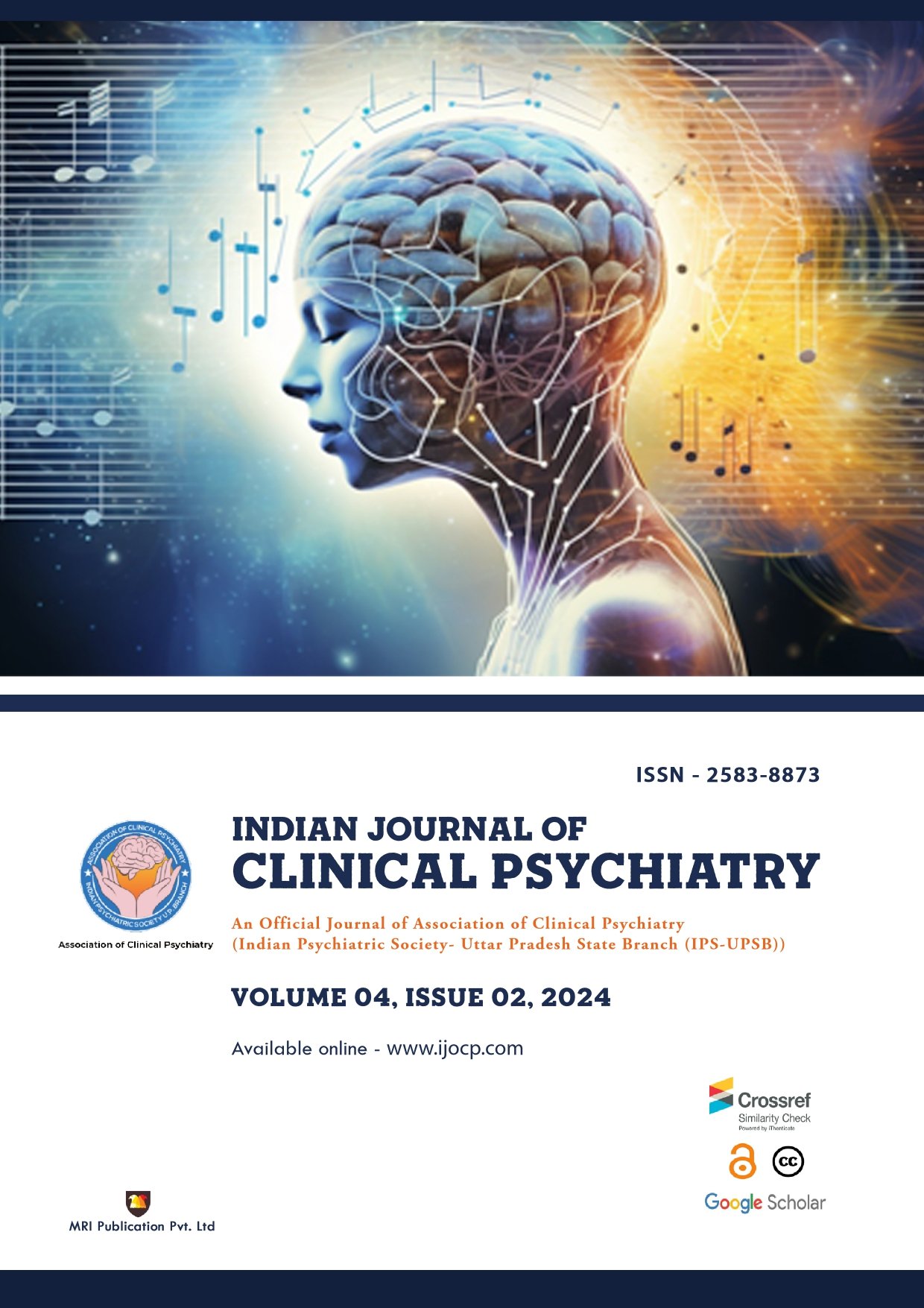Post-stroke Bipolar Affective Disorder: A Case Report
Downloads
Published
Dimensions Badge
Issue
Section
License
Copyright (c) 2022 Kaushal Kishor Singh, Zareen Akhtar, Shashank Saurabh Sinha, Prerak Kumar, Babli Kumari, Mohit Jain, Amit Singh

This work is licensed under a Creative Commons Attribution-NonCommercial-NoDerivatives 4.0 International License.
Post-stroke patients are at substantial risk of developing a spectrum of neuropsychiatric syndromes due to permanent damage to brain parenchyma. Existing literature suggest that depression, dementia, and anxiety are amongst the common organic mental disorders in post-stroke patients. However, little literature exists that report cases of bipolar affective disorder after stroke. Here we have mentioned the case of a 58-year-old person, suffered a cerebral hematoma, then developed depressive symptoms, and subsequently developed manic symptoms. Abstract
How to Cite
Downloads
Robinson R, Jorge R. Post-Stroke Depression: A Review. American Journal of Psychiatry. 2016;173(3):221-231. Available from: doi.org/10.1176/appi.ajp.2015.15030363 Donkor E. Stroke in the 21st Century: A Snapshot of the Burden, Epidemiology, and Quality of Life. Stroke Research and Treatment. 2018;2018:1-10. Available from: doi.org/10.1155/2018/3238165 Medeiros GC, Roy D, Kontos N, Beach SR. Poststroke depression: A 2020 updated review. General Hospital Psychiatry. 2020;66:70-80. Available from: doi. org/10.1016/j.genhosppsych.2020.06.011 Villa RF, Ferrari F, Moretti A. Post-stroke depression: mechanisms and pharmacological treatment. Pharmacology & Therapeutics. 2018;184:131-144. Available from: doi.org/10.1016/j.pharmthera.2017.11.005 Llorca GE, Castilla-Guerra L, Moreno MF, Doblado SR, Hernández MJ. Post-stroke depression: an update. Neurología (English Edition). 2015;30(1):23-31. Available from: doi.org/10.1016/j.nrleng.2012.06.006 Yeh YW, Peng GS. Post-stroke mania precipitated by withdrawal of antidepressant in an elderly patient with chronic major depression. General Hospital Psychiatry. ;33(3):301.e13-301.e15. Available from: doi.org/10.1016/j. genhosppsych.2010.12.007 Santos CO, Caeiro L, Ferro JM, Figueira ML. Mania and Stroke: A Systematic Review. Cerebrovascular Diseases. ;32(1):11-21. Available from: doi.org/10.1159/000327032 Liu CY, Wang SJ, Fuh JL, Yang YY, Liu HC. Bipolar Disorder following a stroke involving the left hemisphere. Australian & New Zealand Journal of Psychiatry. 1996;30(5):688-691. Available from: doi. org/10.3109/00048679609062667 Mnif L, Sellami R, Masmoudi J. Post-stroke emotional incontinence or bipolar disorder? Neuropsychiatric Disease and Treatment. 2016;12:1883-1885. Availablefrom: doi.org/10.2147/NDT.S102273 Bengesser SA, Wurm WE, Lackner N, Birner A, Reininghaus B, Kapfhammer HP, et al. Poststrokebipolar affective disorder. Fortschritte der Neurologie· Psychiatrie. 2013;81(08):459-463. Available from: doi. org/10.1055/s-0033-1335731 Starkstein SE, Boston JD, Robinson RG. Mechanisms of mania after brain injury: 12 case reports and review of the literature. Journal of Nervous and Mental Disease. 1988;176(2):87-100. Available from: doi. org/10.1097/00005053-198802000-00004 Melo RC, Lopes R, Alves JC. Bipolar disorder after stroke in an elderly patient. Case Reports in Psychiatry. ;2014:1-5. Available from: doi.org/10.1155/2014/741934 Berthier ML, Kulisevsky J, Gironell A, Fernández Benitez JA. Poststroke bipolar affective disorder: clinical subtypes, concurrent movement disorders, and anatomical correlates. The Journal of Neuropsychiatry and Clinical Neurosciences. 1996;8(2):160-167. Available from: doi.org/10.1176/jnp.8.2.160 Machado L, Cantilino A. A systematic review of the neural correlates of positive emotions. Brazilian Journal of Psychiatry. 2016;39(2):172-179. Available from: doi. org/10.1590/1516-4446-2016-1988 Saraiva R, Proença F, Gonçalves M, Sereijo C, Barandas R, Coentre R, et al. Poststroke Bipolar Disorder. The Journal of Nervous and Mental Disease. ;209(11):851-854. Available from: doi.org/10.1097/ NMD.0000000000001410 Turecki G, Mari Jde J, Del Porto JA. Bipolar disorder following a left basal-ganglia stroke. The British Journal of Psychiatry : the Journal of Mental Science. ;163(5):690. Available from: doi.org/ 10.1192/ bjp.163.5.690 Sturm VE, Yokoyama JS, Eckart JA, Zakrzewski J, Rosen HJ, Miller BL, et al. Damage to left frontal regulatory circuits produces greater positive emotional reactivity in frontotemporal dementia. Cortex. 2015;64:55-67. Available from: doi.org/10.1016/j.cortex.2014.10.002 Johnson SL, Cueller AK, Ruggero C, Winett-Perlman C, Goodnick P, White R, et al. Life events as predictors of mania and depression in bipolar I disorder. Journal of Abnormal Psychology. 2008;117(2):268-277. Available from: doi.org/10.1037/0021-843X.117.2.268
References
Most read articles by the same author(s)
- Sujita K. Kar, Babli Kumari, Amit Singh, Neuromodulation in bipolar disorder: Diversity of evidences & Practice recommendations , Indian Journal of Clinical Psychiatry: Vol. 2 No. 02 (2022): Indian Journal of Clinical Psychiatry
- Sujita K. Kar, Babli Kumari, Vipul Singh, Undergraduate Psychiatry Teaching and Learning in India: A Bumpy Ride , Indian Journal of Clinical Psychiatry: Vol. 3 No. 02 (2023): Indian Journal of Clinical Psychiatry
- Raviteja Innamuri, Sharad Philip , Jayant Mahadevan, Pratikchya Tulachan, Naga Gorthi, Amit Singh, Anoop G, Guru Gowda, Harita Mathur, Rajesh Shrestha, Shreeram Upadhyaya , Lochana Samarasinghe, Rajitha Marcellin, Shanali Mallawaarachchi, Yasodha Rohanachandra, Samindi Samarawickrama, Positing Nuts and Bolts for an Impactful Poster , Indian Journal of Clinical Psychiatry: Vol. 2 No. 01 (2022): Indian Journal of Clinical Psychiatry
- Yasodha Maheshi Rohanachandra, Shreeram Upadhyaya, Shanali Iresha Mallawaarachchi, Samindi T. Samarawickrama1, Rajitha Dinushini Marcellin1, Rajesh Shrestha1, Pratikchya Tulachan, Naga V S S Gorthi, Lochana Samarasinghe, Jayant Mahadevan, Harita Mathur, Guru S Gowda, Anoop G., Amit Singh, Raviteja Innamuri, Sharad Philip, Choosing and Publishing A Research Project , Indian Journal of Clinical Psychiatry: Vol. 1 No. 1 (2021): Indian Journal of Clinical Psychiatry



